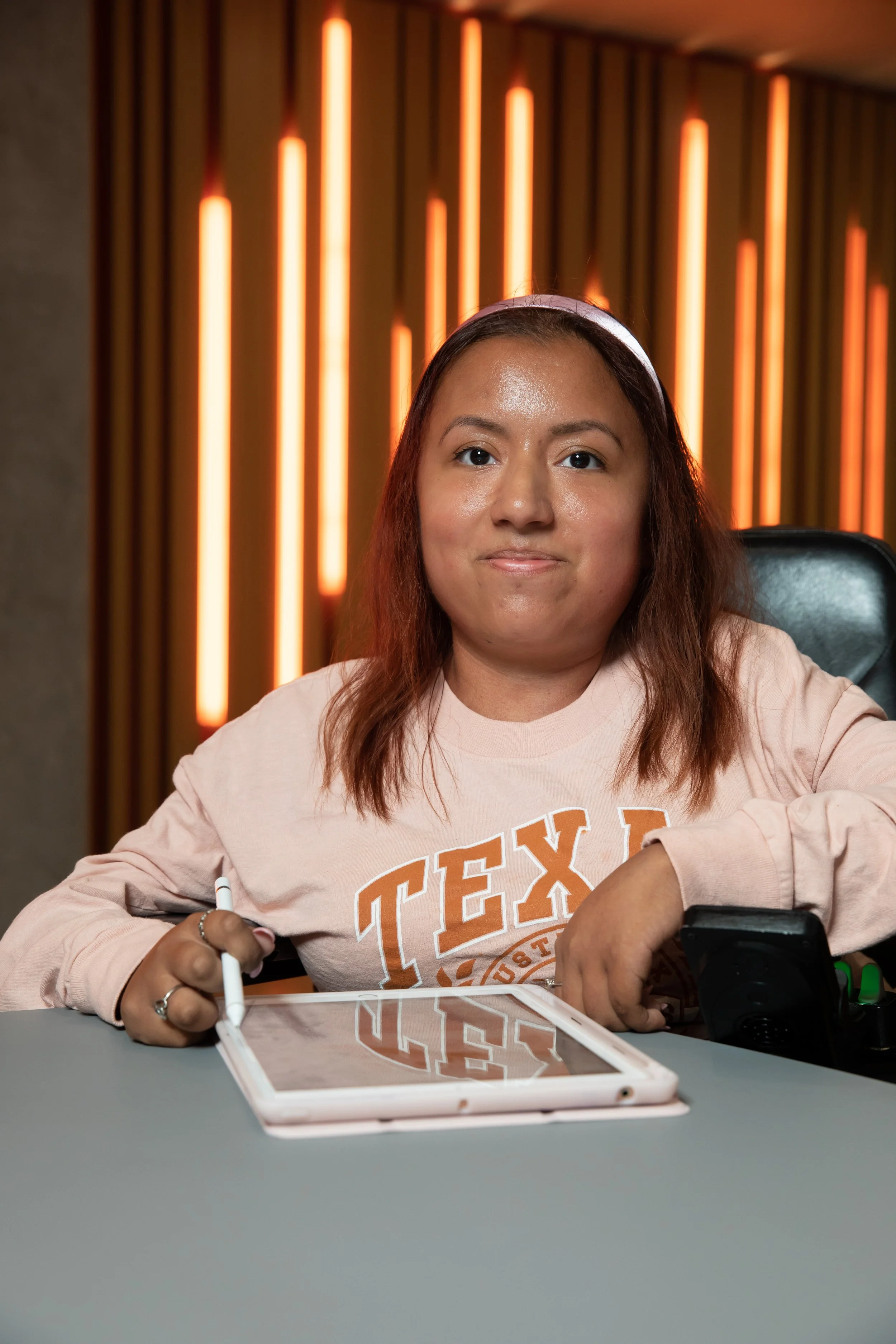A Candid Conversation with Fabiola Amaya (Member Spotlight)
Fabiola seated at table with tablet. Wearing a peach shirt with orange lettering. Orange textured background.
Diversability would like to highlight one of our members, Fabiola Amaya, a budding social worker and disability advocate. Fabiola shared with us a candid, honest conversation about her lived experiences as a disabled person.
Arielle: We are so excited to highlight you as a member of the Diversability Leadership Collective. Let’s start from the beginning, tell me about your disability.
Fabiola: My diagnosis story was incredibly difficult. I was just five years old, and no one could explain what was "wrong with me." I fell often, got tired easily, experienced unexplained pain—and there were no clear answers. After undergoing a series of tests, I was eventually diagnosed with a neuromuscular disorder.
I vividly remember the day I received my diagnosis. The nurses took me out of the room where my parents were and sat me at their desk with coloring pages they had printed out. I do not know how long I was there, but it felt like hours. When I was finally brought back, I saw my parents’ faces—sad, with tears drying on their cheeks. I cannot imagine how terrifying it must have been for them, as non-English-speaking individuals, to receive such life-altering news.
The early years following my diagnosis were confusing, overwhelming, and frightening. My parents had limited knowledge of the medical industrial complex, and I was a child trying to navigate an inaccessible system alongside them.
Arielle: Thank you so much for sharing that. It seems like a lot changed for you and your parents quickly. Can you share about specific things that changed for you all (for the better or worse)?
Fabiola: My life has changed in countless, unexplainable ways since my diagnosis. A few years after, I became a full-time wheelchair user, which was incredibly difficult. I was suddenly thrown into an inaccessible and ableist world with no guidance or support. For a long time, I carried deep anger toward everyone and everything. It was not until my teenage years—when I began exploring online communities of disabled and chronically ill people—that my perspective on disability began to shift.
Those early online spaces became a lifeline. In my late teens and continuing into adulthood, I immersed myself in everything related to disability: disability studies, collectives, literature—I loved it all. Over time, I developed a deep pride in my disabled identity, with all its rich history, culture, and people. I love my community. I wish I could go back and tell my younger self how much better things would become. That the world was not built for her—but that it would be okay, because she and so many other brilliant disabled people would grow up and work to change that.
Arielle: Wow, that’s so powerful. It seems like DLC is the perfect community for you to maintain those connections. You mentioned the emotions varying from gratitude to anger, can you talk a little more about that?
Fabiola: Although I deeply love my disabled identity, the challenges that come with it are undeniable. The world is relentlessly cruel to disabled people—it does not just ignore us, it actively tries to erase us. There is not a single part of my life untouched by ableism: academic settings, workplaces, dating, friendships, hobbies, volunteer spaces, social media. Every corner of life holds some form of exclusion.
I have had to fight for even the most basic things—like access to wheelchair-accessible restrooms or being included in emergency evacuation plans. This constant advocacy is exhausting. I am almost always burnt out, emotionally drained by how inaccessible and ableist the world is, and by how much labor we must do just to receive scraps of inclusion and accessibility.
Arielle: Being disabled truly is exhausting sometimes but it seems like you are very mindful of how that impacts your wellbeing. What have you learned about yourself through your disabled journey?
Fabiola: Something I have learned about myself throughout this journey is my deep passion for community organizing. I am currently pursuing a Master’s in Social Work and hope to work with an organization focused on grassroots disability advocacy. I love planning events—whether they are social and community-building or centered on service, volunteering, and advocacy. I am passionate about every aspect of engaging the community in the fight for what we deserve. Systems have always failed us and will continue to do so, which is why it is up to us—the people—to organize and demand what we want and need.
I recently graduated with my Bachelor's in Social Work from the University of Texas at Austin, where I am now pursuing a Master’s in Social Work. Graduating and being accepted into a top graduate program are accomplishments I am extremely proud of. As a brown disabled woman from an immigrant family, nothing has ever just fallen into my lap. I have had to be two, three, sometimes even four times better than the next person just to be seen as half as capable in the eyes of society.
Arielle: Fabiola, it has been an absolute pleasure learning about your experiences. For fun, can you tell us something you enjoy doing outside of your disability advocacy?
Fabiola: I enjoy anything craft-related! I love painting and coloring, and I recently got into scrapbooking—I've really enjoyed exploring all the different materials and creative possibilities it offers. What I love most, though, is doing these activities with my loved ones. Some of my favorite moments are simply sitting, crafting, and talking with my partner and friends.

